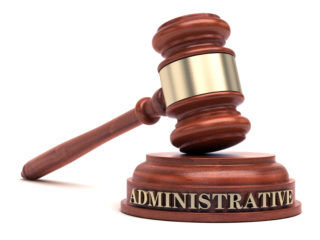 Anyone that does business in a highly regulated environment like cannabis or alcohol needs to have a basic understanding of administrative law. The majority of government interaction as a cannabis business–and the primary sources of headaches–involve state agencies. In Washington, for example, our Liquor and Cannabis Board is the primary regulatory agency, but the Department of Labor and Industries, the Employment Security Department, the Department of Revenue, the Department of Agriculture, and others all play a role in the lives of marijuana businesses. Sometimes agencies feel all-powerful, as if they can govern by fiat. Other times, they seem extremely limited in their abilities to act in certain ways. Cannabis businesses interact with administrative agencies when they are applying for licenses, advocating for regulatory change, and when they are held liable for violations of regulations. Smart cannabis businesses know the ins and outs of authority that their governing agencies wield.
Anyone that does business in a highly regulated environment like cannabis or alcohol needs to have a basic understanding of administrative law. The majority of government interaction as a cannabis business–and the primary sources of headaches–involve state agencies. In Washington, for example, our Liquor and Cannabis Board is the primary regulatory agency, but the Department of Labor and Industries, the Employment Security Department, the Department of Revenue, the Department of Agriculture, and others all play a role in the lives of marijuana businesses. Sometimes agencies feel all-powerful, as if they can govern by fiat. Other times, they seem extremely limited in their abilities to act in certain ways. Cannabis businesses interact with administrative agencies when they are applying for licenses, advocating for regulatory change, and when they are held liable for violations of regulations. Smart cannabis businesses know the ins and outs of authority that their governing agencies wield.
Some background on how these agencies are structured and why they exist is probably in order. We’ll use the federal government as our example because every state is a little bit different, but most are structured similarly to the federal structure. The power to write law is vested in the legislative branch – the U.S. Congress. The power to enforce those laws is vested in the executive branch — the President and federal agencies. And the power to interpret those laws is held in the judicial branch — the court system. Administrative law blends all of those authorities together somewhat and places them, in a limited way, in the hands of a regulatory agency.
Congress is not good at dealing with rapidly changing legal landscapes. Its statutes are written broadly, and meant to stand the test of time. As such, Congress almost always drafts statutes that delegate some portion of its authority to write further laws to the executive branch, via administrative agencies. This Congressional enacting statute provides the general boundaries in which the executive branch, through a named agency or department, can create rules and regulations. That same executive branch agency is also tasked with enforcing those rules, and adjudicating initial disputes of whether those rules are broken (often, with the involvement of administrative law judges).
In the cannabis context, the enacting statute hasn’t tended to come from legislatures — it tends to come from the people in the form of a citizen’s initiative. In that context, the citizens are playing the same role as the legislative branch — writing law for the executive to enforce. Sometimes, the state’s Constitution will allow the legislature to amend an initiative statute, even before it takes effect. Unless the legislature makes a broad alteration, though, the only authority granted to the regulatory body is whatever is included in that initiative. If a regulatory agency like the Liquor and Cannabis Board does something that either oversteps the authority granted in the initiative or acts directly contrary to the initiative, it is acting unlawfully.
But agencies have significant leverage here. First, there is a federal interpretation rule that many states also follow called “Chevron Deference.” Under this rule, if there is vague or ambiguous wording in a statute that grants administrative authority to an agency, courts will defer to that agency’s reasonable interpretation of that language. Agencies get to decide any question about the extent of their power in a way that maximizes that power, so long as it is at least a reasonable reading of that enacting statute. If you are suing an agency, this can be a difficult standard to overcome.
Additionally, you generally can’t challenge an agency action until you have “exhausted administrative remedies.” This means that if you want to take an agency to court because you think it is doing something wrong, you first have to go through the agency’s internal dispute process. This can take time and money, and it often feels like the deck is stacked against you when the writer of the regulation, the enforcer of the regulation, and the judge for that regulatory enforcement are all the same people.
We’ll write more in the coming weeks about agency authority generally, and interacting with regulators specifically. Sometimes, it is good to defer to regulatory decisions and go with the flow, but other times it’s vital that regulated parties push back hard to make sure that their regulators are following the law themselves.

